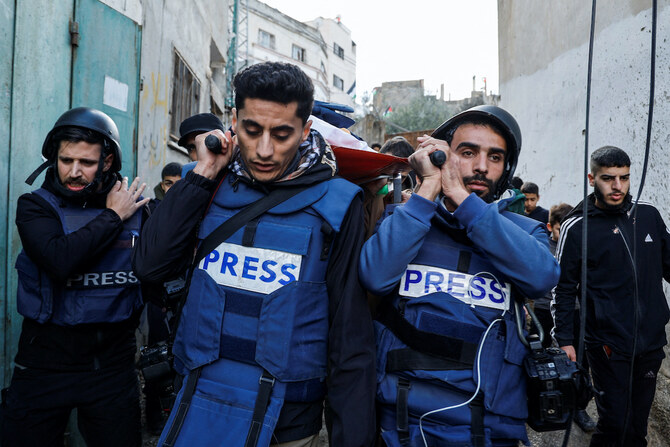LONDON: The year 2024 has been one of the deadliest for journalists in recent history, with 122 media workers killed worldwide, the International Federation of Journalists revealed on Tuesday.
The Brussels-based organization described the year as “one of the deadliest” for the profession, with an average of one journalist killed every three days.
“Our thoughts are with the families and friends of 122 media professionals killed this year. Behind this high figure, there are 122 truncated stories,” said IFJ General Secretary Anthony Bellanger.
The IFJ, the world’s largest union of journalists’ trade unions, reiterated its call for stronger protections for media workers and accountability for their killers
“To guarantee that the deaths of journalists do not go unpunished and to put an end to this scourge once and for all, we urge UN member states to take steps to ensure the adoption of a binding convention on the safety of journalists,” added Belanger.
The report, initially published on Dec. 10 but updated to reflect deaths in the final weeks of the year, highlighted the Middle East and Arab world as the most dangerous region, with 77 media professionals killed in 2024.
This figure, representing over 63 percent of the global total, was driven by conflicts in Gaza and Lebanon, where 71 journalists lost their lives.
The Asia-Pacific region ranked second, with 22 killings, concentrated in Pakistan (seven), Bangladesh (five), and Myanmar, where the military junta has continued to target journalists.
In Africa, 10 journalists were killed, with Sudan bearing the brunt amid a civil war between the Sudanese Armed Forces and the Rapid Support Forces that has raged since April 2023, claiming six media professionals’ lives.
The Americas and Europe recorded nine and four journalist killings, respectively, with deadly incidents reported in war zones such as Ukraine and Haiti. In Haiti, two journalists were recently killed when gunmen opened fire at a press conference to announce the reopening of the country’s largest public hospital.
The IFJ also reported a sharp rise in the number of imprisoned journalists, with 516 media workers detained globally as of Dec. 31, up from 427 in 2023 and 375 in 2022. China and Israel led the list of countries with the highest number of incarcerated journalists.
Meanwhile, a December report by Reporters Without Borders found that 55 journalists remain held hostage, primarily in Syria and Yemen, and 95 are missing.




























